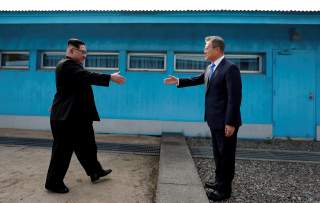America Must Support South Korea's Diplomacy
It is a difficult balancing act, but Washington must support Seoul while also working with it to an ultimate shared end of denuclearization.
While U.S.-North Korea negotiations have hit a standstill, inter-Korea relations are forging ahead with a third summit between South Korean president Moon Jae-in and North Korean leader Kim Jong-un set for September 18–20 in Pyongyang. As South Korea makes it clear that it doesn’t need U.S. permission to engage with its neighbor, America needs to be supportive of these efforts that can keep tensions on the peninsula low to create space for U.S.-North Korea diplomatic maneuvers.
The United States and North Korea are in a diplomatic deadlock, the current impasse rooted in disagreements over next steps: America wants North Korea to declare the details of its nuclear program, while North Korea wants a declaration of the end of the Korean War. On August 24, President Trump canceled a planned end-of-August trip to North Korea by Secretary of State Mike Pompeo and by the new special representative for North Korea, Stephen Biegun. When making the announcement, Trump cited a lack of progress on denuclearization. The two countries seem to be incapable of moving issues forward, even if President Trump insists that things are peachy-keen.
But South Korea didn’t let its diplomatic efforts fall to the wayside in light of U.S.-North Korea frictions. Seoul sent a delegation to Pyongyang on September 5, led by its director of national security, Chung Eui-yong. In his post-trip debrief, Chung announced the dates for the upcoming inter-Korea summit and that a planned inter-Korea liaison office will be opened in Kaesong, North Korea before the summit.
Creating an inter-Korean liaison office was part of the Panmunjom Declaration reached at the first Moon-Kim summit. While South Korea had been consulting on getting waivers to United Nations Security Council sanctions against North Korea to do so, it has now decided that it does not need exemptions to open this office. South Korea is showing the world that it will pursue its plans for inter-Korea relations and projects with or without international support.
Furthermore, Chung, also said that Kim is committed to the denuclearization of the Korean peninsula. Chung also reported that Kim agrees with the South that declaring an end to the Korean War would foster trust and believes that ending the war would have no bearing on the U.S.-South Korea alliance—nor would it require the withdrawal of U.S. troops from the peninsula.
These statements illustrate how South Korea is trying to create diplomatic space for the United States to participate in a declaration of the end of the Korean War. Detractors are concerned that a peace declaration could lead to frictions in the U.S.-South Korea alliance and create pressure to drawdown U.S. troops on the peninsula. Meanwhile, South Korea wants to assure U.S. stakeholders that their fears are unfounded (even though North Korean state media continues to publish content calling for the end of the U.S. military presence on the peninsula). At the same time, South Korea is also publicly stating that it’s onboard with North Korea’s desired sequencing, not America’s; the next step is a peace declaration, not a nuclear program declaration.
It’s easy to be concerned about what will happen with the U.S.-South Korea alliance as South Korea demonstrates its independence and alignment with North Korea on some peninsular issues. If North Korea and South Korea keep deepening ties, American and South Korean goals and priorities could continue to diverge, which could lead to the decoupling and breakdown of the alliance. While decoupling is a real fear, South Korea is making an effort to reassure America that their ultimate goals are in line: President Moon said he wants “irrevocable progress” on denuclearization by the end of the year.
If the United States wants to prevent decoupling, it should be supportive of South Korea’s endeavors and not undermine it with rash tweets or belligerent demands. Taking a hard line against inter-Korean engagement will only push South Korea closer to the North. This is not to say that Washington should be uncritical about the South’s actions, but the Trump administration should stand behind its ally’s efforts that make the Korean peninsula safer and more secure. At the same time, South Korea must make sure that it neither hands North Korea a pass on denuclearization nor gives North Korea a vote on U.S.-South Korea alliance issues. It will be a tough but necessary balancing act.
So far, America has squandered its own hand. President Trump has made clear that it doesn’t matter what his diplomatic team does or what key allies want because he’s more than willing to give away whatever he feels like in the moment, from praise for Kim Jong-un to a summit. North Korea has locked in on this and so personally appeals to President Trump for action. Meanwhile, Pyongyang continues to berate other members of the U.S. administration while insisting that it will do nothing until it gets a peace declaration.
In this atmosphere, South Korea is a critical vehicle for pushing diplomacy forward, and the United States shouldn’t stand in its way.
Abby Bard is a research assistant of Asia policy for National Security and International Policy at the Center for American Progress.
Image: South Korean President Moon Jae-in and North Korean leader Kim Jong Un shake hands at the truce village of Panmunjom inside the demilitarized zone separating the two Koreas, South Korea, April 27, 2018. Korea Summit Press Pool/Pool via Reuters

